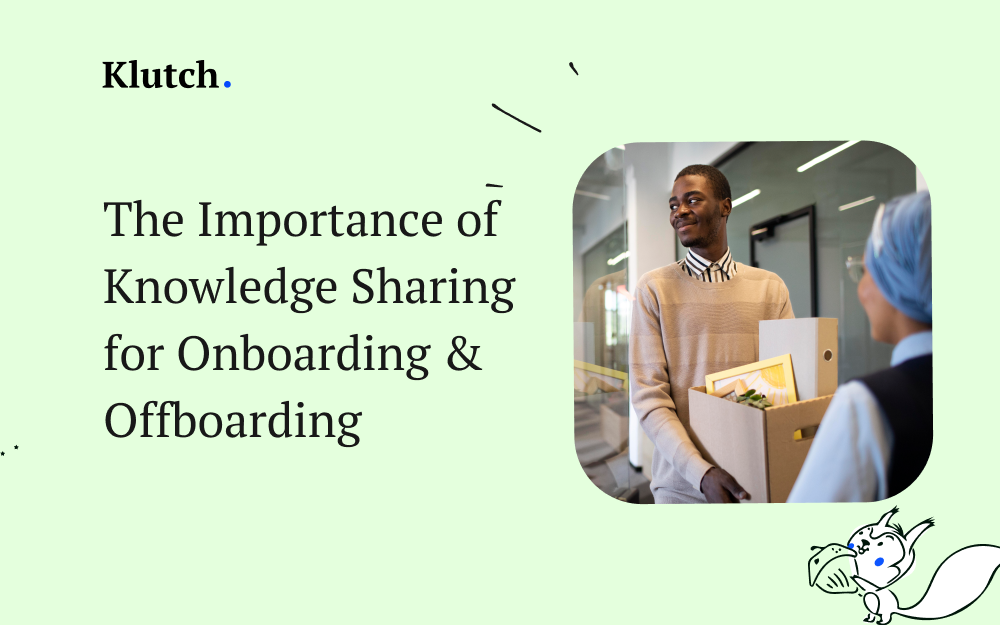Welcoming new employees isn’t as easy as it once was. Previously, you would greet the new hire and introduce them to the workspace, employees, and complex systems you use. Companies now develop onboarding programs to familiarize people with the procedures in place and help them begin working independently as quickly as possible.
Knowledge sharing can increase new employee engagement, open up more learning opportunities, and improve efficiency while boosting team building efforts. In fact, it plays a significant role in onboarding and offboarding processes.
Setting up a knowledge management system is crucial for any business. You want to attract loyal and dedicated workers and create a healthy environment for them.
Ultimately, efficient knowledge sharing in the onboarding process can accelerate the new hire’s integration, reduce errors, and improve engagement and job satisfaction. Likewise, it will assist with offboarding by preserving institutional knowledge, strengthening relationships with the departing employees, and improving future onboarding strategies. Let’s learn more.
The Importance of Knowledge Sharing in Onboarding
Knowledge sharing can benefit your onboarding process in various ways, including:
1- Accelerates New Hire Integration
Whenever a new hire joins the team, they receive a ton of information immediately. There are countless details to remember, such as the online tools they’ll use daily and where the cafeteria is. This can be overwhelming, which might make the newcomer misunderstand or forget things. However, a sufficient knowledge management solution can reduce or prevent such issues.
When you have a lot of information written down so that people can look it up, new hires don’t have to memorize all those little things. It can make them feel more relaxed and confident when they know the data is a few mouse clicks away.
2- Improves Job Satisfaction and Engagement
A knowledge management system offers various learning opportunities, but it also ensures that new employees feel empowered and supported by the company. Therefore, they are satisfied with their work and believe they can achieve their goals.
Knowledge sharing at an early stage will also work to the employee’s benefit later. They won’t only use it for onboarding; they’ll refer to the knowledge management system regularly to get information when they need it most. Because this data hub supports them, they’ll become more engaged and productive, leading to improved job satisfaction.
3- Reduces Mistakes and Errors
One of the biggest issues companies face when onboarding new hires is mistakes. These people are learning how to do things the way you want them, which takes time. Sometimes, they’re simply afraid to ask questions for fear they’ll be considered incompetent. In other situations, they get different answers from multiple people.
When you have a learning management system in place, new hires can get information directly from the source.
Your team of experts has spent hours, weeks, or months creating this infinite knowledge base. They update things periodically to keep it all current. Therefore, the onboarding process is smoother, and you’ll notice fewer mistakes and errors throughout the company.
The Importance of Knowledge Sharing in Offboarding
Though onboarding is essential when bringing in new hires, you also have to focus on the final stage of the person’s journey within your company. This is a time to uphold your values and be supportive. You risk losing more people without ways to assess that relationship and transition the remaining team.
A well-planned offboarding process can help you create a smoother exit that benefits your company and the departing employee in these ways:
1- Preserves Institutional Knowledge
Offboarding includes documenting the important information, processes, and knowledge crucial to the departing person’s role. Highly skilled and long-tenured employees carry a unique understanding and expertise of their daily roles, which is difficult to replace. Hands-on experience is actually the hardest to get back.
In time, knowledge loss from your departing employees can snowball and lead to:
- Lost knowledge, which makes it harder to train and onboard new hires
- Lower company performance because of less efficient processes
- Difficult to find relevant information
- Creation of information and communication silos
- Damaged customer and client relationships
- Reduced productivity that impacts your bottom line
Using knowledge sharing during the offboarding process can avoid the issues listed above.
2- Improves Future Onboarding Processes
When employees depart, they’re likely to offer genuine feedback about the company culture and their work experiences. The good and bad data can help you determine your organization’s weaknesses, strengths, and areas for improvement.
For example, if you receive poor feedback about cultural sensitivity, you may choose to create an inclusion and diversity training program. Exit interviews may also help you uncover issues that arose during the employee’s time there, such as sexism, racism, bullying, or harassment. You can then address them before bad publicity or legal action is required.
3- Strengthens Relationships with Departing Employees
It’s always good to stay in touch with a departing employee, either through LinkedIn or by email. Though the departure might not be amicable, that person may end up working for your company again in the future or could be hired by your competition. Therefore, it’s wise to maintain a cordial relationship.
Strategies for Effective Knowledge Sharing in Onboarding and Offboarding
Understanding how important knowledge sharing is for onboarding and offboarding is only part of the equation. Now, you must learn about the strategies available, such as:
1- Formal Knowledge Management Systems
One of the easiest ways to focus on knowledge sharing is to use the best knowledge management solutions available. It’s much easier to implement a dedicated knowledge base, wiki, or internal collaboration platform than it is to create the entire program yourself.
However, even the best knowledge management system is only as good as the information provided. Therefore, you must set up a strategy for regular contributions and updates from your employees. Though you’ll turn to the experts, don’t neglect all types of input because this can help you see room for improvement in specific areas.
2- Mentorship and Buddy Programs
Pair experienced employees with new hires for knowledge transfer and guidance as part of your onboarding procedure. The mentor will be someone who:
- Encourages new hires to offer their viewpoints
- Is able and willing to share ideas, knowledge, and expertise
Buddy programs often help new hires feel welcome. They also get to know their coworkers better and are encouraged to seek useful information and share it with others.
When you encourage peer-to-peer learning and knowledge exchange among colleagues, you promote a culture of growth. Everyone feels comfortable sharing the information they have, and they aren’t afraid of losing their jobs because they give it freely.
3- Exit Interviews and Documentation
An exit interview with your departing employee can help you capture valuable insights and experiences. You’ll learn what they liked and why they wish to leave. Plus, it could raise red flags when multiple people quit for those same reasons.
Here are a few questions you can ask each departing employee:
- What did you like most about working here?
- What things didn’t you like about the job or atmosphere?
- Was the pay enough? If not, what salary do you think fits this role?
- How were your relationships with other employees and managers?
- How might you describe our workplace culture? How could we improve it?
Once you receive the answers to your questions, encourage documentation of best practices, processes, and the lessons learned during employment. You can have the exit interviewer write this up or ask the departing employee to do it.
Conclusion
When onboarding and offboarding new employees, you need an excellent knowledge management system. This is the central hub of truth regarding your company’s standards and procedures, so it’s a great go-to resource for anyone, including seasoned experts.
Knowledge sharing can help accelerate new hire integration, reduce errors, improve engagement, and much more. In the offboarding process, it will enhance your future onboarding strategies, preserve institutional knowledge, and strengthen your relationship with a departing employee.
When you encourage a culture of continuous knowledge exchange and learning, you improve everyone’s experience. Klutch can help you achieve your goals with its robusts knowledge management system. Sign up for free to get started.



